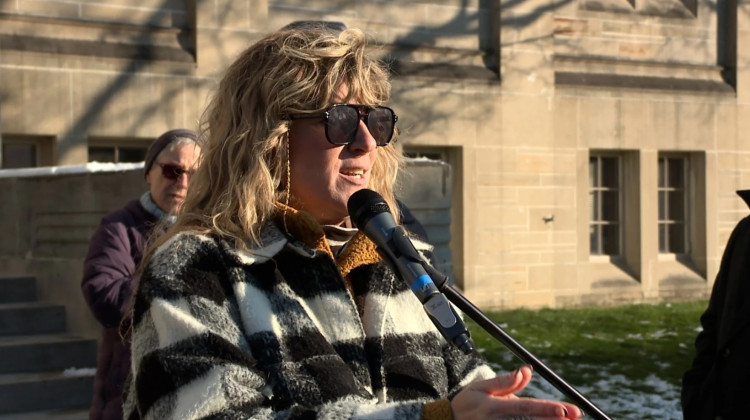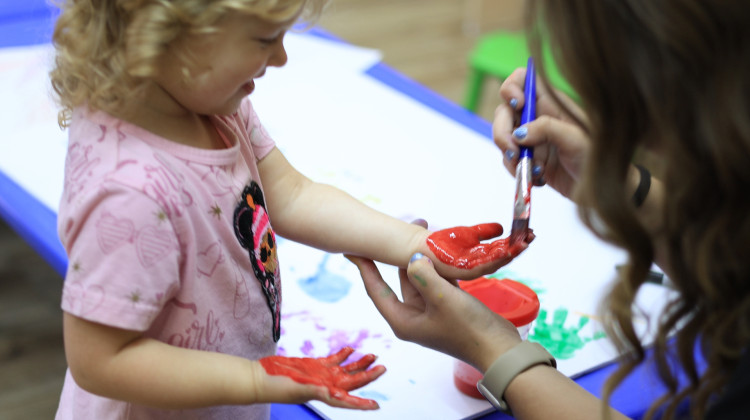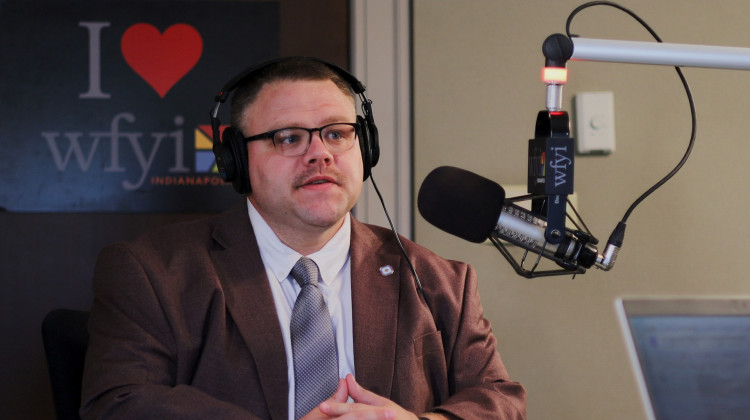
U.S. Secretary of Education Arne Duncan listens to Rosa Ramos Ochoa, a senior at Ben Davis University High School, explain how even though she has a social security number and federal exemption from deportation -- state and federal college loans and grants are not available to her. Dalton Stroud, a Decatur High School senior, is in the middle. Photo: Eric Weddle / WFYI Public Media
Rosa Ramos Ochoa, a senior at Ben Davis University High School, was sure she had earned a scholarship under Indiana’s 21st Century Scholars program, which can provide students with up to four years of college tuition if they meet certain goals, because she finally had a Social Security number.
But it didn’t matter, she told U.S. Secretary of Education Arne Duncan during his visit to Crispus Attucks High School in Indianapolis.
Even though she was such a successful high school student who earned 72 college credits — enough to qualify as a junior in her first year — Ochoa can’t manage to get in-state tuition. It doesn’t matter that she has lived in Indiana since she was 1-year-old. She is still considered undocumented, and that’s all that matters.
“I lost it because I’m not a U.S. citizen,” Ochoa said. “I applied three times before I actually got accepted to 21st Century Scholars. The last time I was in eighth grade, and I really wanted to make a change because my mom works in a warehouse, and she’s had a hard time, and I don’t want to struggle like that in my future.”
Ochoa’s story illustrates a problem Duncan sees across the country, he said.
“It’s honestly one of the biggest frustrations the president and I have,” Duncan said. “We have so many students who have basically lived here all their lives … and to see you do all that hard work and we’re going to deny you the right to go to college? We’re cutting off our nose to spite our face.”
The problems of undocumented students came up more than once as Duncan met with Ochoa and 15 other Marion County students at Crispus Attucks. The education secretary earlier this year criticized Indiana for excluding undocumented students from the state’s On My Way PreK program.
“We have far too many students, particularly from disadvantaged communities, who start kindergarten a year to a year-and-a-half behind,” he said. “I’m happy we’re seeing more governors invest in this, but having said that, there is still a tremendous unmet need. One is the lack of funding for undocumented students.”
During the student panel discussion, one high school student after another told stories about community service, college goals and changes they’d like to see in the city.
“We are being the change by providing 300 bags of food each week for elementary school students,” said Sam Varie, a senior from Lawrence Central High School. “We’re showing peers the importance of serving people in need.”
Ochoa is part of a schoolwide effort to raise money to send a Guatemalan student to high school. It is not free in Guatemala like it is in the U.S.
For her part, Ochoa is determined to continue her studies despite challenges in her past — the move from Mexico as a baby, a father who went to prison, a single mom whose only option was to work hard with little reprieve and next to no money for school.
She holds down a job after school, as well, working at a call center. She manages to do her homework while she’s there. She hopes to study nursing and become a neonatal nurse who helps take care of babies in the intensive care unit after they are born.
“It’s kind of hard — it’s not being punished — but now come other things, sometimes, because of decisions they made, not me,” Ochoa said.
A spokeswoman for Gov. Mike Pence has said Indiana took cues from rules for other federal grant programs when it denied undocumented poor children access to the state’s new preschool tuition aid pilot program.
Duncan says that’s absurd — and it needs to change.
“We want to continue to challenge that,” Duncan said. “It’s a wrong reading of the … statute. So we’re hoping Indiana does the right thing and fixes it. I don’t know of another state that’s both expanding access and denying opportunity. That’s a conflict of values that we will always challenge and never support.”
As for Ochoa, she is hoping to get private scholarships to send her to college. She’s applying for many, and she’s already been accepted to Marion University and IUPUI. Before she could even walk off the stage tonight, she was already being approached by adults from organizations across the city who wanted to help her.
Wayne Township Superintendent Jeff Butts said Ochoa is not the only student in the district with such a story.
He turned to her after the panel, listing her accomplishments — Indiana high school student, academic honors diploma, associate’s degree from Vincennes University — but he said it with an air of disbelief because come graduation in June, it doesn’t make a difference.
Ochoa said other students don’t realize quite how fortunate they are to get more choices about how to pay for school.
“So it’s practically like I’ve never been here, but I’ve been here this whole time,” she said. “Even though I wasn’t born here, I’d like the same opportunity they have.”
Chalkbeat Indiana is a nonprofit news site covering educational change in public schools.
 DONATE
DONATE






 View More Articles
View More Articles




 Support WFYI. We can't do it without you.
Support WFYI. We can't do it without you.